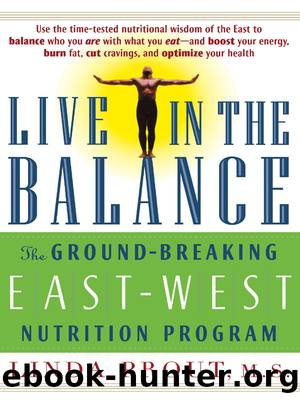Live in the Balance by Prout Linda

Author:Prout, Linda [LINDA PROUT]
Language: eng
Format: epub
Publisher: Da Capo Press
Published: 2011-01-01T00:00:00+00:00
When to Avoid Soy Products
For those with patterns of weak spleen Qi (poor digestion) or patterns of cold or dampness in the body, soy products, and tofu in particular, may not be so healthy. Soy products, including tofu, soy milk, soy cheese, soy yogurt, and soybeans themselves, are cooling and damp-producing and thus not recommended in those with signs of dampness and cold, including diarrhea, anemia, abdominal bloating, depression, pale complexion, and feeling cold. Recent Western research substantiates this correlation, indicating soy products may interfere with digestion and suppress thyroid function, two Western conditions that correlate with Chinese patterns of cold and dampness.39
One of the signs of dampness and cold is indigestion, including gas and loose stools. According to some Western studies, tofu, soybeans, soymilk, textured soy protein, and other unfermented soy products may interfere with digestion by inhibiting the function of a digestive enzyme called trypsin. Beans, which are generally cooling in nature, have substances that inhibit the digestive activity of trypsin. Cooking destroys much of this inhibitor. But soybeans have more inhibitor than other beans, and some is thought to remain even after cooking. Irvin E. Liener, PhD, biochemist from University of Minnesota, says that most soybean products contain 5 to 20 percent of the trypsin activity of raw soybeans.40 Fermented soy products, including miso soup and tempeh, are considered less cooling in Chinese medicine, and as you might guess, have less tryspin-inhibitor activity and are thus more readily digested.
The other issue is thyroid activity. Situated in the front of the throat, the thyroid gland secretes hormones that control metabolism, including body heat. Many signs of low thyroid are the same as those of a cold pattern: feeling cold, irregular periods, and depression. From a Chinese perspective, part of the problem is a pattern of cold, and cutting back on cooling foods such as soy, is recommended. Excess consumption of soy products are suspected of suppressing thyroid activity. Fermented soy products, including tempeh, miso soup, and soy sauce, appear to be less cooling, with fewer thyroid-inhibiting properties and less trypsin inhibitors than unfermented soy foods such as tofu and soy protein powder. Tofu can also be made less cooling by sauteing it with onions, garlic, ginger, or other warming seasonings.
Download
This site does not store any files on its server. We only index and link to content provided by other sites. Please contact the content providers to delete copyright contents if any and email us, we'll remove relevant links or contents immediately.
Inner Engineering: A Yogi's Guide to Joy by Sadhguru(6785)
The Power of Now: A Guide to Spiritual Enlightenment by Eckhart Tolle(5744)
Fear by Osho(4727)
Ikigai by Héctor García & Francesc Miralles(4236)
The Art of Happiness by The Dalai Lama(4120)
The Ultimate Bodybuilding Cookbook by Kendall Lou Schmidt(3927)
Yoga Therapy by Mark Stephens(3741)
The Little Book of Hygge by Meik Wiking(3677)
The Healing Self by Deepak Chopra(3568)
Why Buddhism is True by Robert Wright(3446)
The Hatha Yoga Pradipika (Translated) by Svatmarama(3315)
Being Aware of Being Aware by Rupert Spira(3272)
Shift into Freedom by Loch Kelly(3192)
Wild Words from Wild Women by Stephens Autumn(3137)
Work Clean by Dan Charnas(3112)
Happiness by Matthieu Ricard(3039)
More Language of Letting Go: 366 New Daily Meditations by Melody Beattie(3017)
Yoga Body & Mind Handbook by Jasmine Tarkeshi(2870)
Why I Am Not a Feminist by Jessa Crispin(2742)
